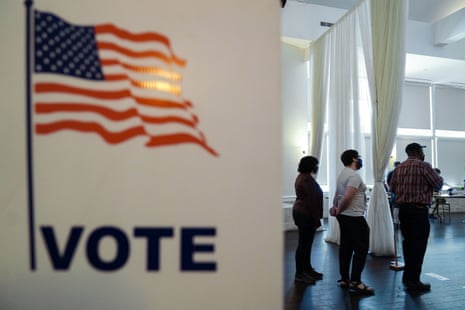The ‘all-out’ effort to overcome Georgia’s new restrictive voting bill
"SB202 is forcing officials and voting rights groups to use every resource to ensure elections run smoothly

In 2021, the Election Integrity Act sent shockwaves across Georgia as citizens learned of new restrictions, such as curbing the way churches could provide pizza and water to voters. However, there are much broader effects of the bill being felt across the state as communities across Georgia prepare for midterm elections, the first major election since the signing of the controversial bill.
The 98-page bill, also called SB202, impacts a litany of election elements ranging from voter ID laws to the distance at which food and water can be distributed to voters waiting in line. Election officials say they are being forced to use every resource at their disposal to navigate the bill and ensure this election season runs smoothly. But there is widespread concern that the new law will create fresh barriers to voters of color and the changing Georgia electorate.
“Internally, we are taking a multifaceted approach, strengthening leadership and expertise throughout departments, and working to beef up skillsets,” said Dele Lowman Smith, chair of the Dekalb county voter registration and election board. “Externally, we are expanding poll worker training and modernizing it to help better address voter concerns when they come up.”
Lowman Smith, who was appointed to the position in July 2021, said it will take an all-out approach to ensure elections run smoothly in her county of more than 500,000 active voters.
Although there were once 31 ballot drop boxes across the county in the 2020 election season, they are now allowed only six for the entire county as the bill prescribes one drop box per 100,000 voters. The time to request and return absentee ballots has dropped from 176 days to 59 days – more than 50% – forcing election officials to contend with a much quicker turnaround. Additionally, rather than completing absentee ballot applications solely online, voters must now include an original signature on their application, requiring access to a printer.
Liza Conrad, deputy executive director of Fair Fight, a voting rights organization based in Georgia, said SB202 significantly burdens voters. “For voters who wish to vote by mail, many are now overcoming these barriers while attempting to make their voices heard,” she said. “If we look back to Georgia’s primary election in May, the rate of rejected vote by mail applications was much higher than that of 2020.”
And while voter education once focused on civic engagement and political education, voting rights organizers such as Helen Butler, executive director of the Georgia Coalition for the People’s Agenda, says engaging voters now has to include education around technology and intricacies of the law out of necessity.
“What we have to do now is canvassing to really educate people about the process. We are trying to make sure people are still able to exercise their right to vote,” said Butler. “Every little thing seems to have had some kind of change. Even the secretary of state ‘my voter’ page [website] has changed, and now voters have to navigate through tabs instead of just having it all on one page, so we’re having to train voters on that now too.”
Conrad, Butler, and Lowman Smith all think it is critical to note that the full breadth of the law goes well beyond absentee ballots, voter IDs and drop boxes. SB202 also limits poll workers’ ability to work at polls outside their county, limiting the capacity of many counties in Georgia as they struggle to find an adequate number of already dwindling poll workers.
Shanice Amira Bennerson worked as a precinct manager for multiple elections between 2020 and 2022. However, after witnessing the impact SB202 changes had on voters during the May primaries, Bennerson decided not to continue her work as a poll worker.
“Trying to help voters who were just so confused and dejected is heartbreaking. When you have limited precincts and voters who are confused by these changes, some voters just left. Tensions are high, and voters were understandably frustrated,” said Brennerson. “When you couple this with all of the new rules from [SB202] and the limited training we get, it almost feels like a disaster waiting to happen.”
Voting organizations such as the Georgia Coalition for the People’s Agenda and Fair Fight have sought ways to engage and encourage poll workers and election boards across the state to address capacity and education on a larger scale. Fair Fight is hosting a “Vote Gold Georgia” tour calling for intentional and expanded voting sites and voting times.
Still, some voting rights organizations hope to call attention to the many changes prompted by SB202 by highlighting the voters most impacted by the law.
“Anti-voter bills like SB202 are a response to Black, brown and young voters turning out and claiming their power in 2020,” says Conrad. “And so, we are working to continue to make sure that these communities continue to participate and make their voices heard and that the poll workers who keep our democracy functioning are empowered and protected.”
Meredyth Yoon, litigation director for Asian Americans Advancing Justice Atlanta, also thinks the bill unjustly targets voters of color, and hopes to bridge the gap in access it could create.
Her group is reallocating resources and shifting its voter education approach to fully educate its communities around changes in timelines, requirements and other recent election changes.
“Overall, the impact of the bill is on voters of color, and it was not an accident or unknown to legislators that these communities would ultimately be affected,” says Yoon. “These sorts of tactics are traditionally the types of restrictions that are intended to impact voters of color on the assumption of how voters of color will vote.”
No comments:
Post a Comment